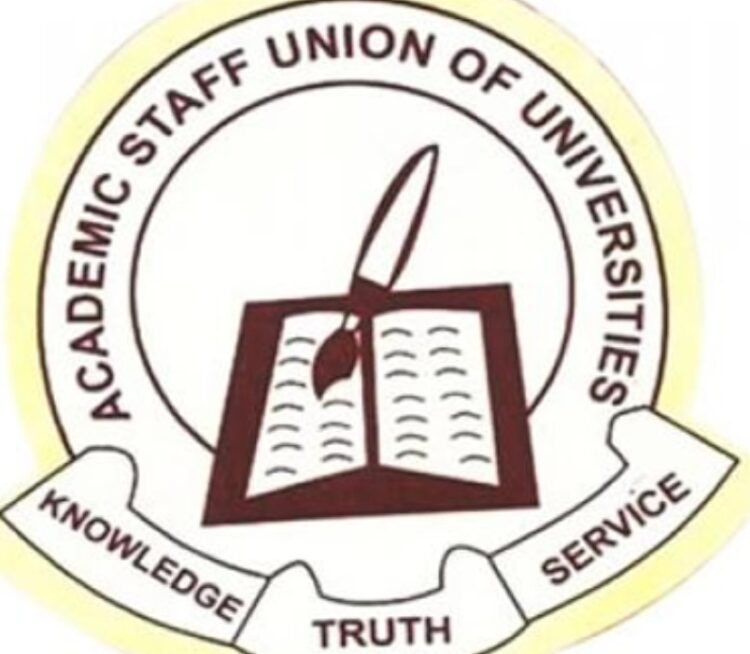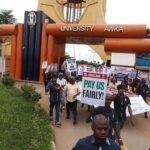On Tuesday, members of the Academic Staff Union of Universities (ASUU) initiated a nationwide protest to draw attention to what they characterize as the Federal Government’s ongoing disregard for their long-standing demands.
At the University of Jos, union members held a demonstration before speaking to journalists, during which they announced their complete rejection of the newly introduced Tertiary Institution Staff Support Fund loan scheme.
Joseph Molwus, the ASUU branch chairperson, stated that the initiative was not a solution but rather an intentional effort to drive lecturers further into financial difficulty.
He described the loan scheme as a “poison chalice,” intended more to impoverish university teachers than to address their actual economic challenges.
He contended that lecturers don’t need loans; instead, they require the payment of their legitimate entitlements, which the government has neglected to fulfill.
He questioned how the government could expect us to borrow money for healthcare, school fees, and basic needs when it still owes us withheld salaries, allowances, and arrears.
At the University of Lagos, members of ASUU participating in the nationwide protest called for improved conditions for lecturers and enhancements to the education sector.
The lecturers carrying placards called for the Federal Government to pay arrears, enhance their welfare, and renegotiate the 2009 FG-ASUU agreement.
The scenario was identical at both the University of Benin in Edo State and the Federal University Gusau in Zamfara State, where lecturers engaged in protests to convey a powerful message to the Federal Government: uphold the 2009 agreement or face another strike.
The union chairman at Federal University Gusau, Abdulrahman Adamu, spearheaded the protest and criticized the government for neglecting Nigerian universities. He lamented that funding responsibilities have been entirely placed on TETFUND while academic staff endure numerous hardships.
He disclosed that the Federal Government has yet to pay ASUU for three and a half months of salaries from the 2020 strike, along with outstanding promotion arrears and wage award arrears ranging from twenty-five to thirty-five months.
Likewise, the academic staff at Federal University Dutse in Jigawa State joined their colleagues across the country to protest against the non-payment of three months’ salary arrears by the Federal Government.
Isma’il Ahmad, the Chairman of the university’s union, stated that the government has ignored the challenges faced by university lecturers and has not upheld the 2009 agreement.
He stated that the current salaries paid to lecturers are hardly sufficient for their livelihood.
The union demanded that, rather than providing loans, the government should disburse funds to address outstanding commitments. These obligations include unpaid salaries, earned academic allowances, promotion arrears, revitalization funds, wage awards, and unremitted third-party deductions.
ASUU voiced its frustration regarding the government’s failure to finalize the renegotiation of the 2009 FGN-ASUU agreement. The union accused the government of neglecting collective bargaining principles, despite years of discussions and numerous committee report submissions.
The union emphasized that the failure to address these issues has left lecturers feeling hopeless and warned that the industrial harmony experienced by universities for over two years is now in grave jeopardy.
They observed that the government has repeatedly made promises without following through and warned that if urgent measures aren’t implemented, the country might experience yet another extended disruption of academic activities.
The union also highlighted President Bola Tinubu’s 2022 campaign promise that university strikes would not happen during his tenure.
The lecturers expressed that they had once pinned their hopes on that promise; however, two years into his administration, they are now disillusioned as the major issues remain unresolved.
They called on the president to personally engage with ASUU leaders in order to prevent a crisis, urging him to “renew the hope” of lecturers and the education sector as a whole.
The union emphasized its dedication to dialogue but cautioned that patience is running thin. It further warned that, unless the Federal Government promptly resolves the issues, universities are at risk of falling into another crisis.



